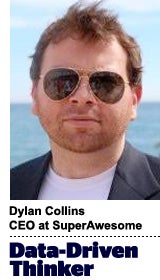 “Data-Driven Thinking” is written by members of the media community and contains fresh ideas on the digital revolution in media.
“Data-Driven Thinking” is written by members of the media community and contains fresh ideas on the digital revolution in media.
Today’s column is written by Dylan Collins, CEO at SuperAwesome.
The European digital ad market is bracing itself for May, when the General Data Protection Regulation (GDPR) becomes enforceable. Advertisers and brands are scrambling to come to grips with new laws that put wholesale restrictions on how third-party data is used to target ads.
The notion of anonymity and advertising has always seemed rather utopian, but with increased measures for consumer privacy being baked into browsers and operating systems, the future of digital media will inevitably be more privacy-friendly than today. Some have speculated that GDPR will kill data management platforms (DMPs) and send advertising back to the Stone Age.
However, this may not be the case. Currently one of the fastest-growing ad markets in the world, PwC predicts the kids’ digital media market will top $1.2 billion by 2019. Uniquely – at least until May – the market is entirely privacy-based, defined by a legally enforced anonymous engagement model.
The closer one looks at the kids’ digital media market, the more parallels you can draw with GDPR and the future of at least the European media market. The kids’ sector has had data privacy compliance requirements in place for several years, initially through COPPA in the US, but GDPR will extend the same standards to Europe. This has led to an enforced set of privacy-based ad standards for kids, such as the prohibition of cookies and persistent trackers.
Propelled by TV’s decline and an overwhelming migration to tablets and phones, the kids’ digital media space is now growing at 25% annually, according to PwC. That’s a lot of momentum behind privacy-based advertising.
The privacy requirements of the kids’ market have forced some of the world’s biggest brands and content owners to completely rethink how they advertise, accepting that they have to take an entirely contextual approach to engagement. This challenge led to the emergence of privacy-by-design technology built specifically for this zero-data environment.
Another parallel between kids’ digital and post-GDPR is the required attention to creative.
The last decade of investment and innovation in the ad tech ecosystem has gone into the data management and the bidding pipelines, but at the expense of the visual experience. In “kidtech,” what flows through the pipes requires as much attention as the delivery mechanisms.
For example, the creative appropriate for an eighth-grade boy is vastly different from the creative that works for a first-grade girl. In a post-GDPR world, marketers will need to find what makes highly engaging and appropriate ad experiences inside adult audiences to continue to make advertising effective, while respecting consumers’ right to be forgotten.
For data-driven advertisers, the notion of not having personal information to target may seem like the apocalypse. Many argue that it’s simply untenable, and therefore GDPR won’t work. But not only has the continued growth of the kids’ digital media ecosystem demonstrated that the opposite is true, it’s also training a generation of consumers to expect a more privacy-based ad experience in the future.
As an overall media market, the kids’ space is still dominated by TV, making it years behind the evolution of the mainstream advertising sector. But in the midst of its digital evolution, it may offer a real glimpse into the future of how advertising will change for everyone over the next decade.
Follow SuperAwesome (@GoSuperAwesome) and AdExchanger (@adexchanger) on Twitter.











